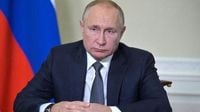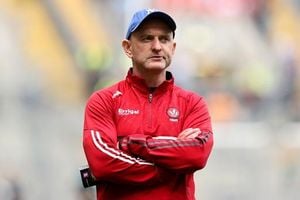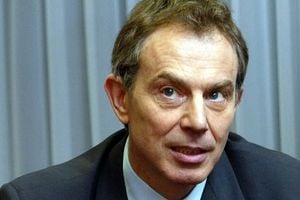Russian President Vladimir Putin has voiced deep concern about the escalating global tensions and the looming threat of World War III, highlighting the intensifying conflicts in Ukraine and the Middle East as critical flashpoints. Speaking at the St. Petersburg International Economic Forum on June 21, 2025, Putin declared, "It is disturbing. I am speaking without any irony, without any jokes," underscoring the seriousness with which he views the current international situation.
Putin emphasized the growing potential for conflict, stating, "There is a lot of potential for conflict now. We are concerned about the possibility of a global war. All conflicts must be resolved by peaceful means." His remarks came amid the ongoing Israel-Iran conflict, which began on June 13, 2025, following a surprise Israeli offensive targeting Iran’s nuclear facilities, military infrastructure, and prominent scientists. This conflict has now entered its ninth day, with repeated strikes escalating fears of a wider regional war that could spiral into a global catastrophe.
The Russian leader highlighted that the conflict’s dangers are "right under our noses" and directly affect Russia, urging the international community to seek peaceful solutions. He also criticized NATO’s continued eastward expansion, labeling it "yet another vestige of the West's neocolonial policy," a stance reflecting Moscow’s long-standing grievances about Western military alliances encroaching near its borders.
Putin’s concerns are compounded by the precarious status of Iran’s nuclear program. Despite Tehran’s insistence that its nuclear activities are peaceful, its uranium enrichment levels have surged to 60%, alarmingly close to weapons-grade material. Israeli Prime Minister Benjamin Netanyahu has vowed to continue military operations until Iran’s nuclear ambitions are destroyed, calling them an "existential danger." Netanyahu’s determination was clear: "We will fight as long as necessary to destroy Iran’s nuclear program." This stance has heightened fears of a nuclear disaster, especially with the International Atomic Energy Agency (IAEA) Director-General Rafael Grossi warning that an attack on Iran’s Bushehr nuclear power plant could release dangerous radioactivity.
Moscow’s involvement in Iran’s nuclear infrastructure adds another layer of complexity. Russian specialists are actively constructing two new reactors at the Bushehr facility, and Putin confirmed that Israel has assured Russia that its personnel at the plant will not be harmed. He also noted that US President Donald Trump had pledged support to guarantee the safety of Russian staff there.
Meanwhile, reports surfaced of an Israeli airstrike on Iran’s Isfahan Defense Industries, a key weapons base known for producing the "kamikaze" Shahed drones. These drones have been supplied by Iran to Russia and used in the conflict against Ukraine, illustrating the tangled web of alliances and proxy warfare. The strike reportedly set the facility ablaze, though Iranian authorities have yet to issue an official statement.
On the Ukrainian front, the conflict continues unabated. On June 21, 2025, Russian drones launched attacks on the southern port city of Odesa and the northeastern city of Kharkiv, resulting in at least one fatality and injuring nearly two dozen civilians, including teenagers aged 17 and 12. These attacks occurred amid ongoing tensions, with Kremlin officials anticipating announcements for new direct peace talks, though the prospects remain uncertain.
In the same televised interview where he expressed his fears about global conflict, Putin reiterated his controversial view of Ukraine, stating, "I believe the Russian and Ukrainian peoples are one. In this sense, all of Ukraine is ours. Wherever a Russian soldier steps is ours." These remarks, which drew applause from his audience, reflect the Kremlin’s narrative justifying its military actions and territorial claims, further complicating diplomatic efforts to resolve the war.
Putin also described Israel as "a Russian-speaking country," referencing the significant population of former Soviet citizens who migrated there in the 1990s. While this demographic detail is accurate, it contrasts with the political realities, as many of these immigrants tend to support Ukraine in the ongoing conflict. Nevertheless, Putin has used the presence of Russian speakers abroad to frame Russia’s involvement and influence in various geopolitical arenas.
Addressing Israel’s reported threat to assassinate Iran’s Supreme Leader Ali Ayatollah Khamenei, Putin expressed hope that such statements remain "just rhetoric," signaling Moscow’s desire to avoid further escalation. The delicate balancing act Russia maintains—supporting Iran’s nuclear ambitions and military capabilities while maintaining diplomatic ties with Israel—reflects the complex geopolitical chessboard in the Middle East.
Putin’s candid admission of worry over a potential global war marks a rare moment of open concern from the Russian leader, who has been in power since 1999. His acknowledgment that "there's a lot of potential for a conflict, of an expanding conflict, and here under our nose" ties together the interconnected crises in Ukraine and the Middle East, both of which pose significant risks to international stability.
As the world watches these developments with bated breath, the stakes could not be higher. The possibility of a nuclear disaster looms large, with the IAEA’s warnings about the Bushehr reactor underscoring the fragility of the situation. The intertwined conflicts, the involvement of major powers, and the volatile rhetoric from all sides create a tinderbox scenario where a single misstep could ignite a broader conflagration.
Yet, despite the grim outlook, Putin insists on the necessity of peaceful resolutions. "All conflicts must be resolved by peaceful means," he said, urging careful attention and dialogue. Whether the international community can heed this call remains to be seen, as the world stands precariously close to a new and unprecedented era of conflict.




